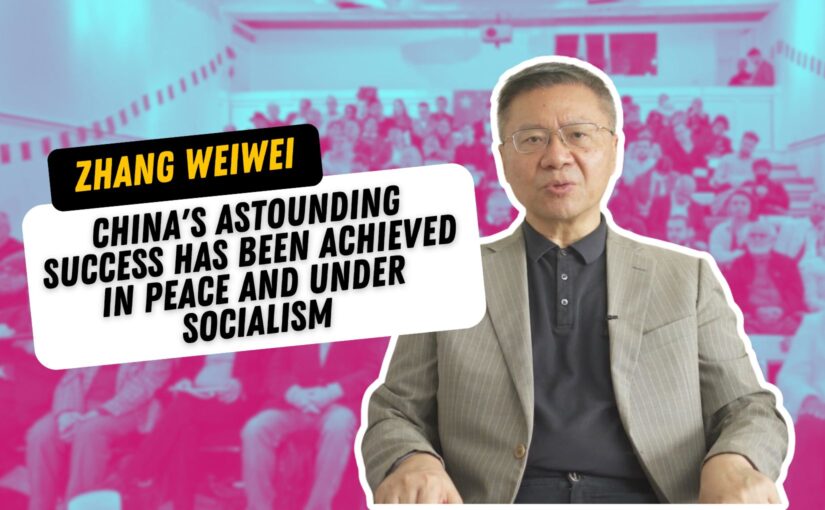The following text and video are from a pre-recorded contribution by Professor Zhang Weiwei at the London conference organised by Friends of Socialist China to mark the 75th anniversary of the founding of the People’s Republic of China.
Professor Zhang notes that China has “accomplished almost one industrial revolution every decade since the early 1980s”, with the result that it is now at the forefront of the Fourth Industrial Revolution. Furthermore, it is sharing its progress with the world, in particular the developing countries.
Zhang further observes that, whereas the West’s modernisation was achieved through war, plunder, colonialism and imperialism, “China’s stunning success has been achieved in peace and under socialism under the leadership of the Communist Party of China”.
He concludes:
Of course, China is by no means perfect, and it is still faced with many challenges, yet I also believe that with China’s extraordinary achievements over the past 75 years, we will be able to overcome these challenges and do even better in the years and decades to come.
Zhang Weiwei is a professor of international relations at Fudan University and a senior research fellow at the Chunqiu Institute, in Shanghai. He has written extensively in English and Chinese on China’s economic and political reform, China’s development model and comparative politics. In the mid-1980s, he worked as a senior English interpreter for Deng Xiaoping and other Chinese leaders. He is one of China’s leading public intellectuals.
Hello, everyone,
On the occasion of the 75th anniversary of the People’s Republic of China, I am more than happy to join you to celebrate this great occasion from Shanghai. With 75 years of socialist construction, China has become the world’s largest economy by purchasing power parity since 2014, and today China is the largest industrial, manufacturing and trading nation, with the world’s largest middle class and extreme poverty eradicated and life expectancy two years higher than the United States. Furthermore, thanks to Chinese socialism, at a speed of accomplishing almost one industrial revolution every decade since the early 1980s, China is now at the fore-frontier of the Fourth Industrial Revolution (with big data, AI and quantum technologies, etc) and now the only country capable of providing goods, services and experience from all the four Industrial Revolutions to the whole world. All this has changed China and the world forever.
Indeed, the first group of countries rising up during the 18th and 19th centuries like Britain and France had a population around tens of millions; the second group of countries rising up during the 20th century like the US and Japan had a population around one hundred million; and China’s rise in the 21st century represents a population of over one billion, which is more than the total populations of the previous two groups combined. Furthermore, China’s stunning success has been achieved in peace and under socialism under the leadership of the Communist Party of China, rather than through wars and plunders under colonialism and imperialism for the West.
What’s more important, China’s rise is not that of an ordinary country, but that of a socialist civilizational state, which means, China is an amalgam of the world’s longest continuous civilization and a super-large modern socialist state, with has at least four features, i.e. (i) a super-large population, (ii) a super-vast territory, (iii) super-long traditions and (iv) super-rich cultures, each of which is a blend of ancient and modern, more specifically, a blend of China’s past and its modern socialist adaptations and innovations.
Taking the super-long traditions as an example, China’s ancient traditions have evolved, develped and adapted in virtually all branches of human knowledge and practices. For instance, the West is critical of China’s one-party system, yet to most Chinese, it’s nothing extraordinary: since its first unification in 221 BC, China has been mostly governed by a unified ruling entity, otherwise the country would have disintegrated. China had copied the American political model following its 1911 Republican Revolution and the country degenerated into warlords fighting each other with millions of lives lost.
In its history, China’s unified ruling entity was mostly sustained by a system of meritocracy, with officials selected through public exams or the Keju system since the Sui Dynasty close to 1500 years ago. Since 1949, under the CPC’s leadership, this ancient system has been adapted into today’s what I call “selection + election”. China’s top echelon leaders have almost all served at least twice as the No.1 of a Chinese province, which means they have administered in most cases more than 100 million people before taking up their current positions. As a result, China’s top echelon leadership is obviously among the most competent in the world.
The tradition of a unified ruling entity has carried with it a holistic way of political governance. I would describe Western-style political parties as partisan interest parties and the CPC as a holistic interest party. This explains why China is able to reform and reinvent itself all the time, pioneering the way to overcome all kinds of vested interests and ensure an overall balance between political, social and capital powers in favor of the vast majority of its people. As a result, most Chinese are the beneficiaries of China’s dramatic transformation, a hallmark of Chinese socialism today.
Of course, China is by no means perfect, and it is still faced with many challenges, yet I also believe that with China’s extraordinary achievements over the past 75 years, we will be able to overcome these challenges and do even better in the years and decades to come. On this positive note, I stop here and wish your celebration a great success!

